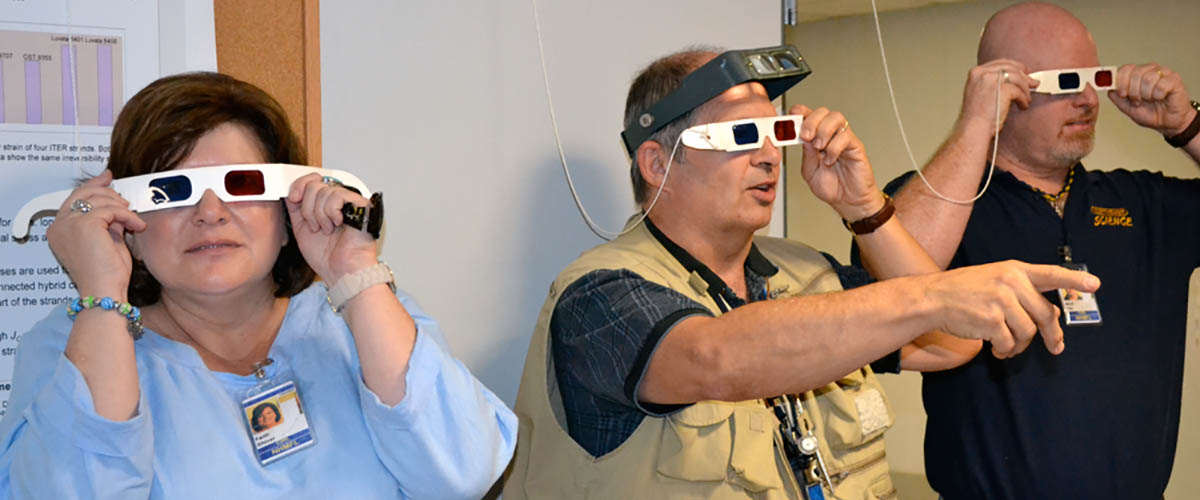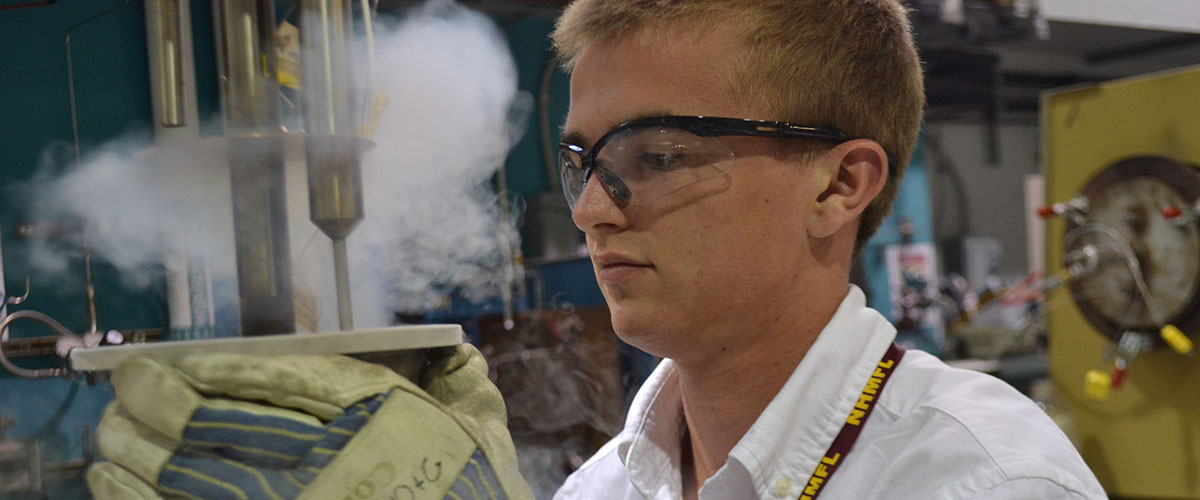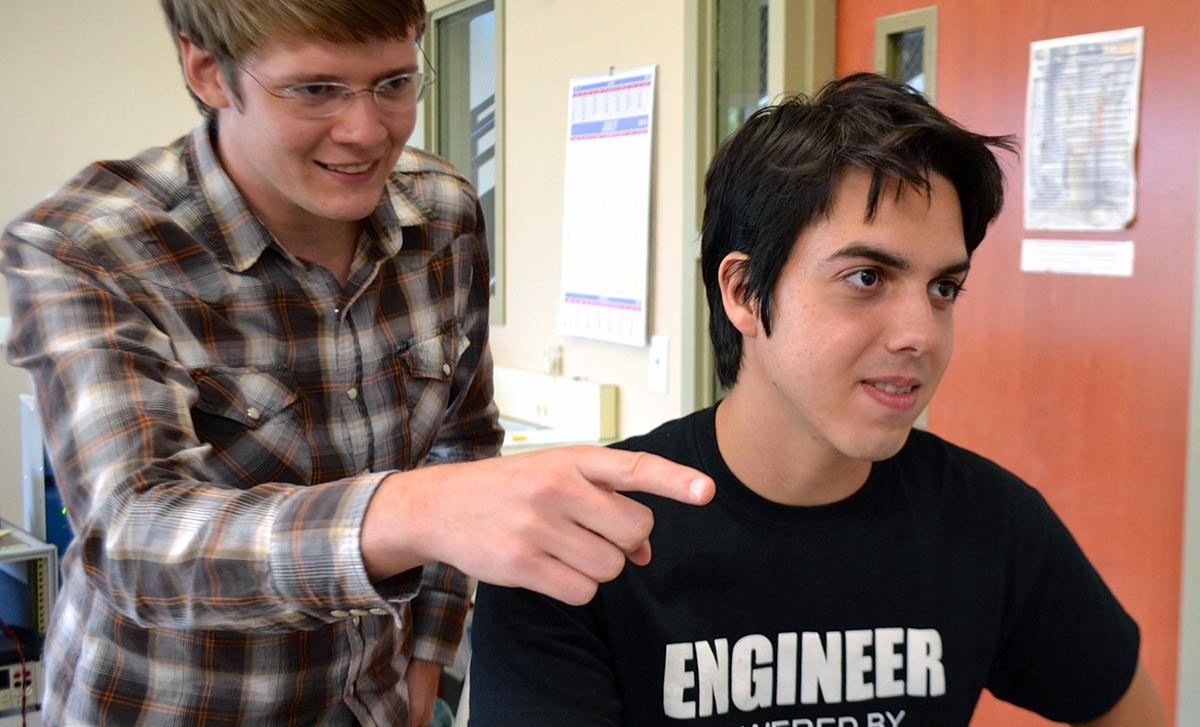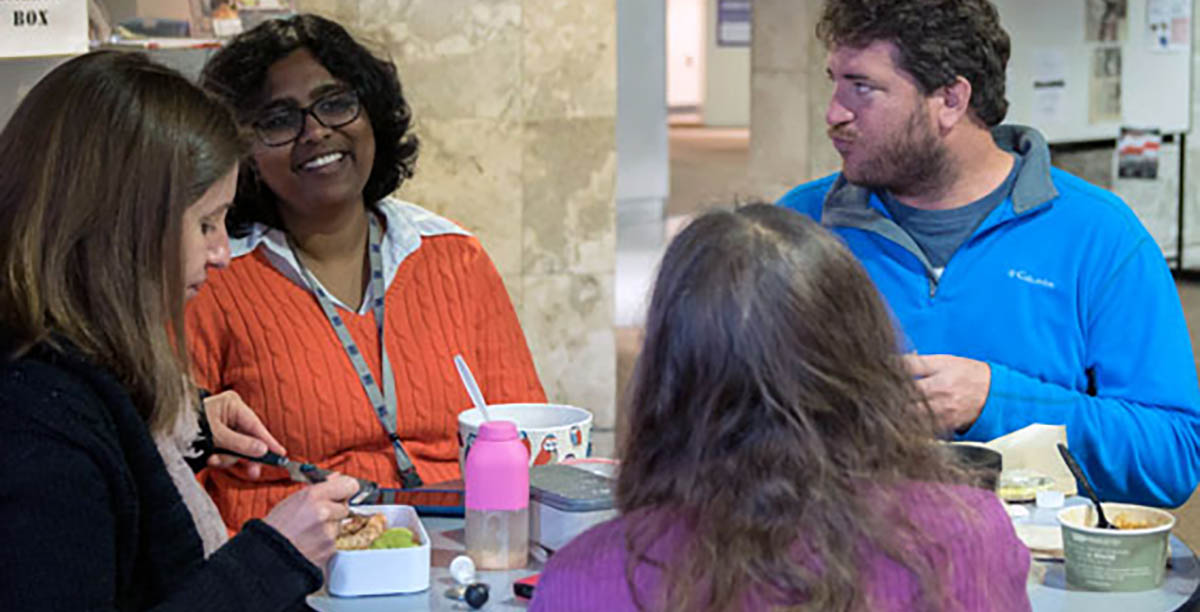Why do you mentor?
I originally volunteered to be a mentor because I have one of the few areas in the Magnet Lab that students can come in and actually safely activate and operate some of the machinery without much safety training. They can actually get data, and they can actually do scientific experiments — and it’s fun!
I also found that I really enjoy working with the students and teachers. I like sharing my love of science.
Give an example of an assignment you've given a student or teacher.
For one mentoring project, when we had an environmental microscope, we looked at French fries, just to see what the starch grains inside them looked like after they'd been fried up. Some of them, you couldn't even tell that they were actually potatoes anymore. That was pretty fun. With my teachers, we also examined fabrics — polyester, cotton, even bulletproof vests — and looked at the microscopic structure and why some fabrics perform better than others.
These days, I exclusively mentor teachers because I just don't have enough time to mentor middle-school students anymore. The teachers don't take as much time, and they're also looking for a research experience. So in recent years, I've been able to incorporate my teachers more and more into the actual day-to-day research that I do.
For example, in my lab, we have bundles of filaments, and the filaments all have different colors based on elements, and we need to know what percentages of those elements are in the wire strands. That's the problem the teachers figure out. There's a lot of math involved with it, and it's very, very rigorous. But by the end of their internships, the teachers have accomplished a goal of doing something they didn't know how to do originally, and that's a very empowering experience.
What makes you a successful mentor?
I really don’t think of it as mentoring as much as I do a mutual sharing.
When I take on teachers or students, they want to learn what I know, and they want to learn how to do things the scientific way. And I teach them that. But if there are other ways that they have of looking at this project, that’s of interest to me and it helps me out. So I actually can get new ideas from the teachers.
Have you seen that “aha” moment experienced by any of your students?
Oh, yes, all the time. I usually see the light bulb go off when they realize the assignments that I’ve been giving them, it’s all been for a purpose. All that careful, painstaking polishing of the materials they’ve done, there’s been a reason for it. That usually happens when they look under the microscope, and they see things that you can’t see unless you’ve done a very good job of polishing. That’s when they realize the incredible job they’ve done — and when that happens, they get that special satisfaction. And I’m excited, too, I’m excited for them. It’s an amazing feeling. Because what we do at the Magnet Lab, looking at these very small objects, it’s miraculous. … We can go up to 3 million times magnification, with no distortion!
I do get some teachers who come in with a preconception that, ”This is mysterious, and I’m never going to learn it.” I tell them from the very start, “That’s not the case. If you have questions, we’re not going to proceed until you fully know what’s going on.”
I had a teacher once who had been teaching for 30 years, and she was very afraid to tackle any of the science I was doing, even just using the microscope. But by the end of her internship, she was operating the microscopic and doing the math and operating the computer programs. That’s why I do this, because seeing that happen is very gratifying to me.
Are there certain characteristics in your students and teachers that predict their success as scientists?
That’s a hard question in some ways, but I really think it’s the ones who aren’t afraid to try, those are the ones that make the best scientists. The ones who, no matter how wacky it sounds, they’ll try it.
When a teacher comes to me and says, “Will this work?” I say, “What do you think?” If it’s a safe thing, I tell them to go ahead and try it and see if it works. Because even when I know something is not going to work, there’s no amount of me telling them it’s not going to work that will make the same impression on them as their own, direct experience of seeing it not work.
The only words I hate to hear from a teacher are, “I don’t think I can do that.” I say, “Well, there’s a thing called ‘try,’ and then there’s a thing called ‘do,’ like Yoda said. So what you do is, you do it.” And so, they do it. These teachers are very bright; sometimes they just need a little encouragement.
Do you have any funny moments that stand out?
(Goddard recalled a joke that he and a fifth-grade teacher played on a kindergarten teacher from Hosford, Florida. )
I had a spare keyboard that was a junk keyboard. So one day I was typing on the computer, and I acted as if I suspected something bad had just happened.
“I can’t stand this anymore!” I said, and I picked up the keyboard and threw it across the room and the keys flew everywhere.
The kindergarten teacher looked at me and said, “Well, I’m glad we’re done with that.” That was pretty funny. It didn’t rattle her at all. Not at all. It surprised her, but it didn’t shock here. If that had been me, I would have been pretty shocked.
Anyway, I sometimes do things like that, and it kind of livens up the mentorship period. And I always find that they really pay attention after that.
How would you like your students to remember you?
I hope they would say, “He made me learn science in a fun way.” Because there are two things I tell all my teachers: 1. You’re going to learn at least a few things here that you’ll be able to take back to your classroom, and 2. You’re going to have some fun doing it.
Any advice you'd give to someone who wants to mentor?
Be patient. Don’t underestimate the ability of the people you’re mentoring. I don’t pare down things at all. I don’t tell them the baby aspects, I give them the true science of it. And I think their reactions to it are amazing. They are open to doing something and seeing the result and making the connection. And that’s what makes all of it worthwhile.
By Kathleen Laufenberg






